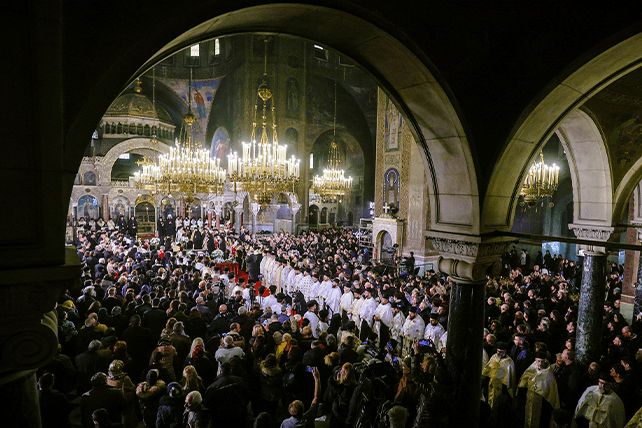Eastern Orthodoxy is a fellowship of over a dozen independent churches — known as “autocephalous” in Greek — each led by its patriarch and ruling a defined geographical region.
Historically, Constantinople was the center of the Orthodox Christian world. The Patriarch of Constantinople wears the title “ecumenical” and is styled the “Primus Inter Pares,” meaning “first amongst equals.” Constantinople is considered by many to be the “mother church” of the other Orthodox churches, and the ecumenical patriarch has traditionally served as a mediator between the major churches.
Since the outbreak of full-scale war between Russia and Ukraine in 2022, churches across Eastern Europe have been riven over their connections with the world’s largest Orthodox body, the Moscow Patriarchate.
Russia broke communion with Constantinople and several aligned churches in 2018, in response to the Ecumenical Patriarch Bartholomew’s move to grant autocephaly to Ukraine’s Orthodox Christians — organizing them into a semi-independent church under the Constantinople Patriarchate. Since then, Bartholomew has lent his support to other Orthodox parishes seeking to exit from the Russian Church, such as those in Lithuania, and brought them under his wing.
The gap between the Russian Church and the other Orthodox churches has continued to widen, as Moscow Patriarch Kirill is increasingly seen as a mouthpiece for Vladimir Putin. In March, Kirill declared the Russian invasion to be a holy war, and last summer, the Russian Orthodox Church’s top-ranking priest in Bulgaria was expelled from the country on charges of espionage. Russia has frequently been accused of using its church as a sort of shadow foreign service.
According to observers, Russia is keeping a close eye on Bulgaria’s patriarchal election.
“The Russian Orthodox Church is starting to lose ground in Bulgaria, which is why it is offering support to those metropolitans who stay on the Russian side,” Goran Blagoev, a Bulgarian journalist and historian, told Balkan Insight.
While the Bulgarian public and government have largely supported Ukraine since the Russian invasion, the church has been more divided.
More than five years on, the Bulgarian Church has not taken a final position on Ukraine’s autocephaly, and many view the church’s leadership as divided into Russophile and anti-Russia factions.
Last month, when a group of metropolitans traveled to Istanbul to attend a celebration at the ecumenical patriarchate that the head of the newly autocephalous Ukrainian church would also be attending, they were blasted by other church leaders, including Metropolitan Gabriel of Lovech.
When Metropolitan Epiphanius, the head of the Autocephalous Ukrainian Church, attended the funeral of Bulgaria’s former patriarch, Neophyte, it also incensed some church leaders and pro-Russia figures in Bulgaria.

